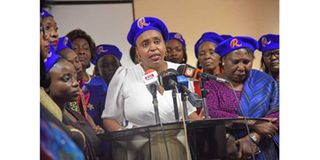Women leaders now demand 50-50 gender rule

Nyeri Deputy Governor Carol Karugu leads Azimio La Umoja women leaders in addressing journalists at Jacaranda Hotel in Nairobi on April 18, 2022, when they proposed Narc Party leader Martha Karua as their preferred running mate for presidential flag-bearer Raila Odinga.
What you need to know:
- Nyeri Deputy Governor Caroline Karugu said women comprise 50.5 per cent of the population, hence issues touching on them have to be a national agenda.
- Nairobi Governor Ann Kananu observed the need to respect the Constitution, which gives women equal rights as men.
A section of women leaders is now rooting for a fifty-fifty gender rule to put men and women on a par in political and economic spheres.
The leaders are drawn from 26 political parties and Maendeleo Ya Wanawake Organisation. Those from the Azimio La Umoja One Kenya coalition said the 50-50 sharing formula should replace the elusive two-third gender rule. They spoke in Nairobi on Monday.
To achieve their goal, they have called for a debate that will culminate in equal sharing of political and economic opportunities between men and women ahead of the August 9 General Election.
Population
Nyeri Deputy Governor Caroline Karugu, citing the 2019 census, said women comprise 50.5 per cent of the population, hence issues touching on them have to be a national agenda.
“Today, the women of this country are now saying that they are no longer looking at getting at least one third of opportunities in government but half of them. They also want to be involved as stakeholders not only in the political sphere but also in the economic realm by being involved in the baking of the cake,” said Ms Karugu.
She said the women are strategically seeking to have the post-August election administration to factor in their proposals for political and economic empowerment.
“All the women of this country are asking is to be given an equal opportunity as partakers of political and economic opportunities in government with their male counterparts. To achieve this, we are going to employ a very diplomatic approach devoid of protests but one that will be based on negotiations with our male colleagues in leadership,” she added.
Trailblazers
Karugu thanked women trailblazers in the political arena, among them Narc Kenya leader Martha Karua, Kitui Governor Charity Ngilu, former Karachuonyo MP Phoebe Asiyo and the late Wangari Maathai, for fighting for the women fraternity.
Nairobi Governor Ann Kananu observed the need to respect the Constitution, which gives women equal rights as men.
Ms Ngilu noted that by the virtue of being more than half of the population in the country, women should have proper representation across all spheres.
“The only good thing is to ensure that everyone in Kenya, including women, shares in the opportunities that exist. It is high time women were also represented at the decision-making table,” she said.
For decades, women have been lagging behind in political and economic inclusion, despite a spirited campaign to rectify the anomaly. The 2010 Constitution brought hope after it entrenched the two-third gender principle, which mandates the state to take measures to ensure that not more than two thirds of holders of elective and appointive positions are of the same gender.
However, more than 10 years after the supreme law was inaugurated, there has yet to be specific legislation to operationalise this constitutional provision, with Parliament failing to find a solution. Representation of women in Parliament has been and remains minimal, with only 22 per cent of the legislators being women.
Under-representation
Only 9.8 and 20.7 per cent of the 10th and 11th parliaments respectively were women. And besides the political arena, the under-representation of women in positions of power either in the Cabinet, Public Service or state corporations have been a concern.
According to the Ministry of Public Service and Gender, most women occupy lower areas of economic performance than men because of patriarchal norms.
It is for this reason that the ministry came up with the Women Economic Empowerment Strategy 2020/25 that seeks to sensitise women and build their capacity towards empowering them economically.
The five-year strategy captures the challenges and solutions and seeks to provide guidance and direction. It recognises that women economic empowerment is a process where their lives are transformed from limited power due to gender barriers, to a situation where their power is equal to that of men.
Women who account for almost half of the population are the main victims of unemployment and underdevelopment. In Kenya 13 per cent of women are unemployed.





